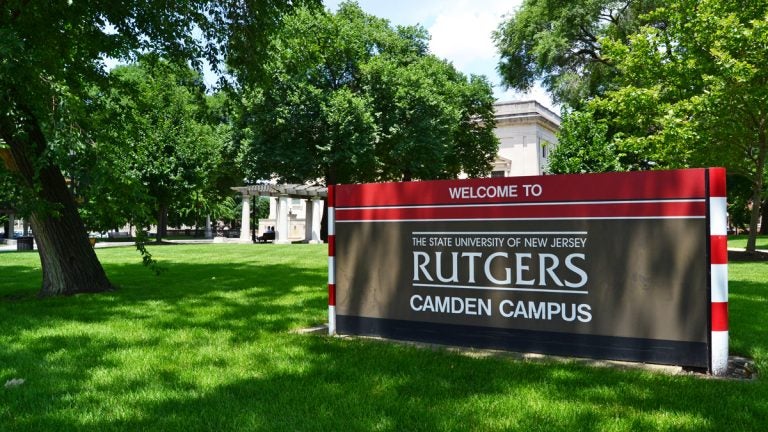Profile: Rutgers-Camden Chancellor Phoebe Haddon

(Marcus Biddle/for NewsWorks)
 Who she is: Phoebe Haddon
Who she is: Phoebe Haddon
Job: Haddon replaced Wendell Pritchett as Rutgers-Camden chancellor on July 1, 2014.
Her job, by the numbers: As chancellor, Haddon oversees 6,300 students in 67 undergraduate and graduate programs. Her 40-acre campus employs 1,100 workers and operates on an annual budget of more than $173 million. As “executive director” of the campus, she reports directly to the university president.
Former jobs and education: Before coming to Camden, Haddon served as dean of University of Maryland’s law school. During her tenure, the Baltimore-based law school received a $30 million donation, the largest ever pledged to the university, to create a joint degree with the Johns Hopkins business school Before that, the Passaic native spent 25 years as a faculty member at Temple University’s Beasley School of Law. She received a Master’s of Law from Yale, a law degree from Duquesne University — where she edited the law review — and a bachelor’s degree from Smith College.
Awards and acknowledgements: The National Jurist called her one of the “25 Most Influential People in Legal Education” in 2012 and again in 2013. The Daily Record of Baltimore named her one of the “Top 100 Women” in Maryland and one of the year’s most Influential Marylanders. In 2011, the Society of American Law Teachers gave her the Great Teacher Award.
Why her tenure comes at a pivotal time for the campus: After several years of struggles, it appears that the state Legislature has finally reached a working compromise with Rutgers’ governing boards that will keep the university relatively free from political interference. But the agreement comes after faculty, students, and administrators revolted against an attempt from Trenton to sever the Camden campus and turn it over to Rowan University, in Glassboro. Now a joint board that includes appointees from the governor, the community, and both universities has a $5 million annual budget to build a jointly run health sciences school in Camden and make decisions regarding the development of new health programs at both institutions. Thanks in part to Pritchett’s vocal opposition to the merger proposal, the role of chancellor is viewed as one responsible for safeguarding autonomy and intellectual freedom on campus.
Affirming her stated commitment to defend the school against outside encroachment, Haddon said, “I come from the faculty … I think it’s really critical of any chancellor of any university to make it clear that academic decisions are made by academic leaders.”
Within the university itself, the New Jersey Medical and Health Sciences Education Restructuring Act of 2012 gave the Camden campus more independence from the central administration, added a campus board of directors, and changed the funding formula so that some funds come directly to the Camden campus instead of getting funneled through New Brunswick.
How she intends to implement the master plan: Haddon takes over just as Rutgers President Robert Barchi and his team are implementing the university’s first new master plan in almost 20 years. Haddon’s first weeks in Camden were spent wrapping up the final writing phase and figuring out how to make the campus-specific part of the plan work. She spent that time walking the campus, asking questions, holding student and faculty forums, attending community meetings, and doing a lot of listening.
“I would go out and say, ‘This is what I’ve heard and what I’ve read.’ And I’d test it out. A lot of it was consistent but it allowed us to refine the language in the plan,” she said.
What she learned is that her faculty doesn’t like working in silos. They want to collaborate through the disciplines on ideas and projects — an approach that dovetails nicely with Haddon’s own self-described style, and they like the “homey” and “nurturing” feel to the campus.
“I came from a campus of various schools so it’s something that I was already familiar with,” she said. This is perfect. I look forward to hosting lunches or dinners and inviting people from different departments.”
What else she plans to do: With civic work already part of the campus’ curriculum, Haddon wants to find ways to combine those volunteer endeavors with paid internships so students don’t have to “double up on jobs.” She also wants to encourage students to take for-credit miniclasses that center around solving a real-world problem. These classes contain a short study-abroad component that puts students on the ground to test their solutions. She calls experiential learning the “best kind of education.” She will also turn her attention to growing the student body and increasing the percentage who live on campus.
What she loves about being chancellor: “Moving from one thing to another very quickly,” she said. “You might be very, very happy, engaged, empowered then the next minute you’re solving a problem. Despite the best laid plans something comes up.”
What she misses as an administrator: Writing. She used to write about fairness and equality issues and wishes she still had time to pursue it.
What she does in her spare time: Haddon would say very little about herself during an interview, redirecting most answers to what she values about Rutgers-Camden. But she would say that she enjoys yoga and walking as ways to de-stress and bring mindfulness into her life. She also says that she appreciates moving back into the Philadelphia home she shares with her husband, who’s also an attorney. While Haddon lived in Maryland, her daughter stayed in their house. She takes obvious pride in her daughter, one of three grown children and stepchildren, who volunteered for Teach for America and now attends Yale Law School. Once she passes the bar, she’ll become a fifth-generation lawyer.
____________________________________________________
NJ Spotlight, an independent online news service on issues critical to New Jersey, makes its in-depth reporting available to NewsWorks.
WHYY is your source for fact-based, in-depth journalism and information. As a nonprofit organization, we rely on financial support from readers like you. Please give today.




